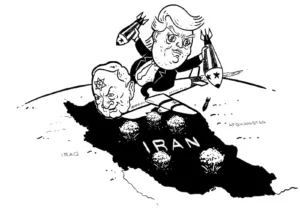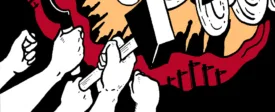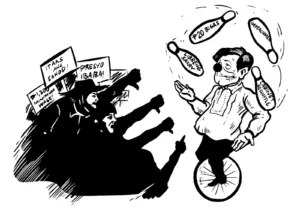The National Democratic Front of the Philippines (NDFP) successfully held its third international theoretical conference in Amsterdam, The Netherlands, on November 29-30. The conference focused on the theory of national liberation from imperialism. It was attended by 114 individuals representing 57 proletarian-socialist parties, national liberation movements, and anti-imperialist organizations.
It can be recalled that the first and second theoretical conferences held in October 2023 and March 2024 discussed imperialist war and the imperialist economic crisis. According to the NDFP, the third conference covered theoretical and practical contributions by Lenin, Stalin, and Mao on national liberation, including various methods of struggle and promotion of the right to self-determination, both armed and unarmed. The first day of the conference was dedicated to presenting prepared contributions, while the second day plenary session summarized the points raised by the delegates.
Topics discussed included the detrimental effects of imperialist aggression and proxy wars on the freedom and independence of nations. The discussions also covered various challenges confronting ongoing national liberation movements and the need to continue consolidating and defending their successes. Among the topics discussed was the building and strengthening of international support for these movements.
The Communist Party of the Philippines (CPP) warmly welcomed the focus on national liberation at the third conference. The main article written by the Central Committee of the CPP states: “The struggle of oppressed peoples around the world for national liberation today remains one of the crucial elements in the overall strategy for advancing the international revolutionary cause of the proletariat.”
According to the CPP, due to imperialist oppression, national liberation or national self-determination from colonization became the most fervent aspiration of the oppressed peoples. In these countries, the big comprador bourgeoisie is tied to the colonial economy and subservient to the imperialists, and the petty bourgeoisie and national bourgeoisie are weak. Therefore, it was incumbent upon the working class to unite all oppressed classes and lead the struggle for national liberation. In the era of imperialism and proletarian revolution, a new type of bourgeois-democratic revolution led by the proletariat has emerged, serving as a preparatory stage for carrying out socialist revolution and construction.
The contributions of various participants at the conference helped deepen and enrich the discussions on national liberation. A Cyprus revolutionary group shared the role of their territory in imperialist wars in the Middle East and North Africa. Currently, it is used by five NATO powers (Turkey, Greece, US, United Kingdom, and France) as a base and launching pad for the US and Zionist Israel’s genocidal campaign in Palestine and the expansion of aggressive wars in the Middle East.
Meanwhile, communist forces in Turkey and Kurdistan discussed their respective struggles. The Turkish movement is a struggle in a country dominated by imperialist powers, while the Kurdish movement is oppressed by the comprador state of Turkey. The Kurdish movement also has deep ties with the Palestinian struggle, where their fighters first trained.
Overall, the discussions were productive, and the delegates achieved a new level of unity. The parties and organizations also expressed strong support for the liberation movement in Palestine and groups promoting it, including Hamas. Besides the mentioned countries, participants from Eritrea, Nepal, Senegal, Italy, and the US also contributed their perspectives and insights.
The conference concluded with a special cultural performance on November 30 to commemorate the 60th anniversary of the Kabataang Makabayan and its historic role in advancing the revolutionary youth movement in the Philippines and encouraging unity with the Philippine revolution.












